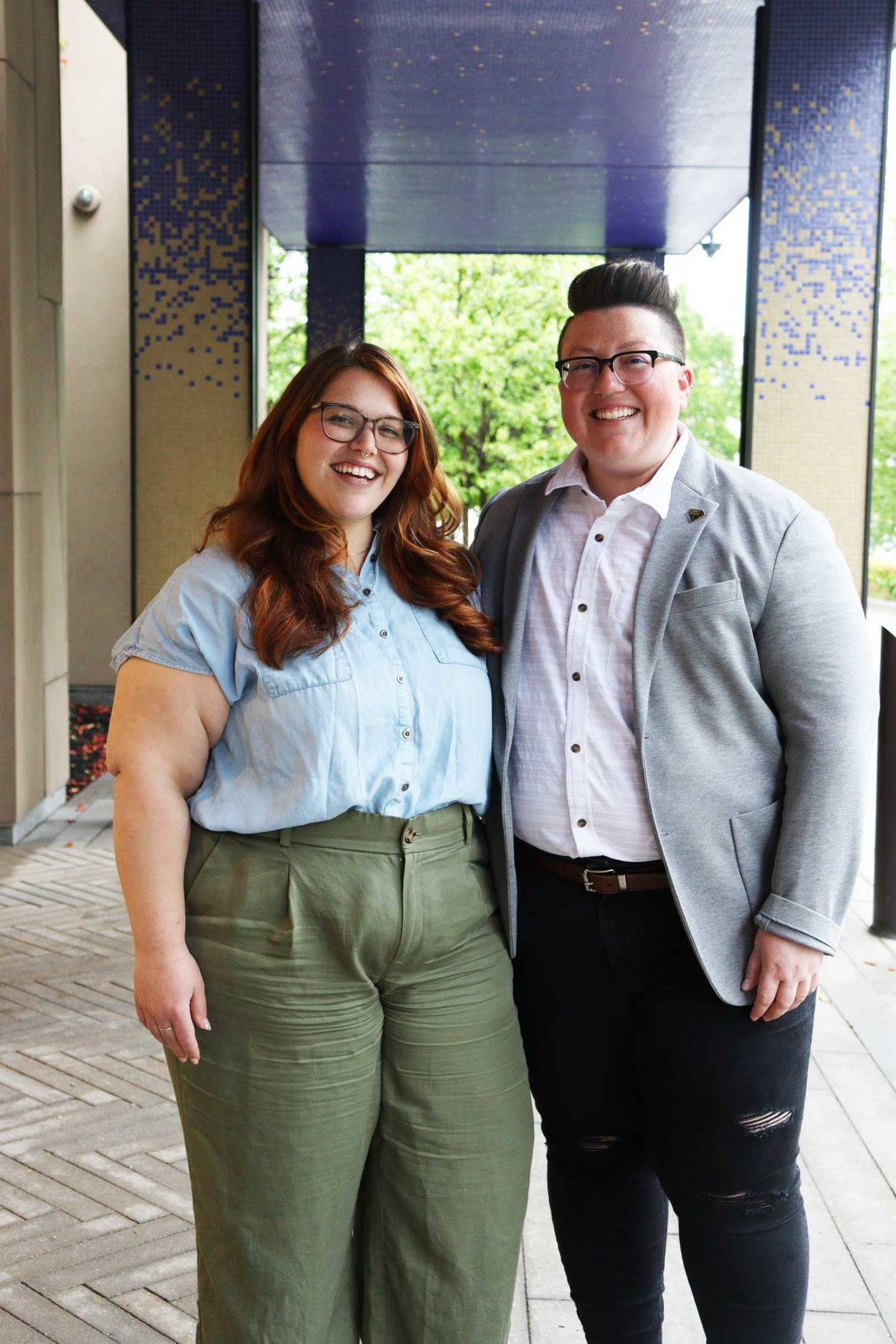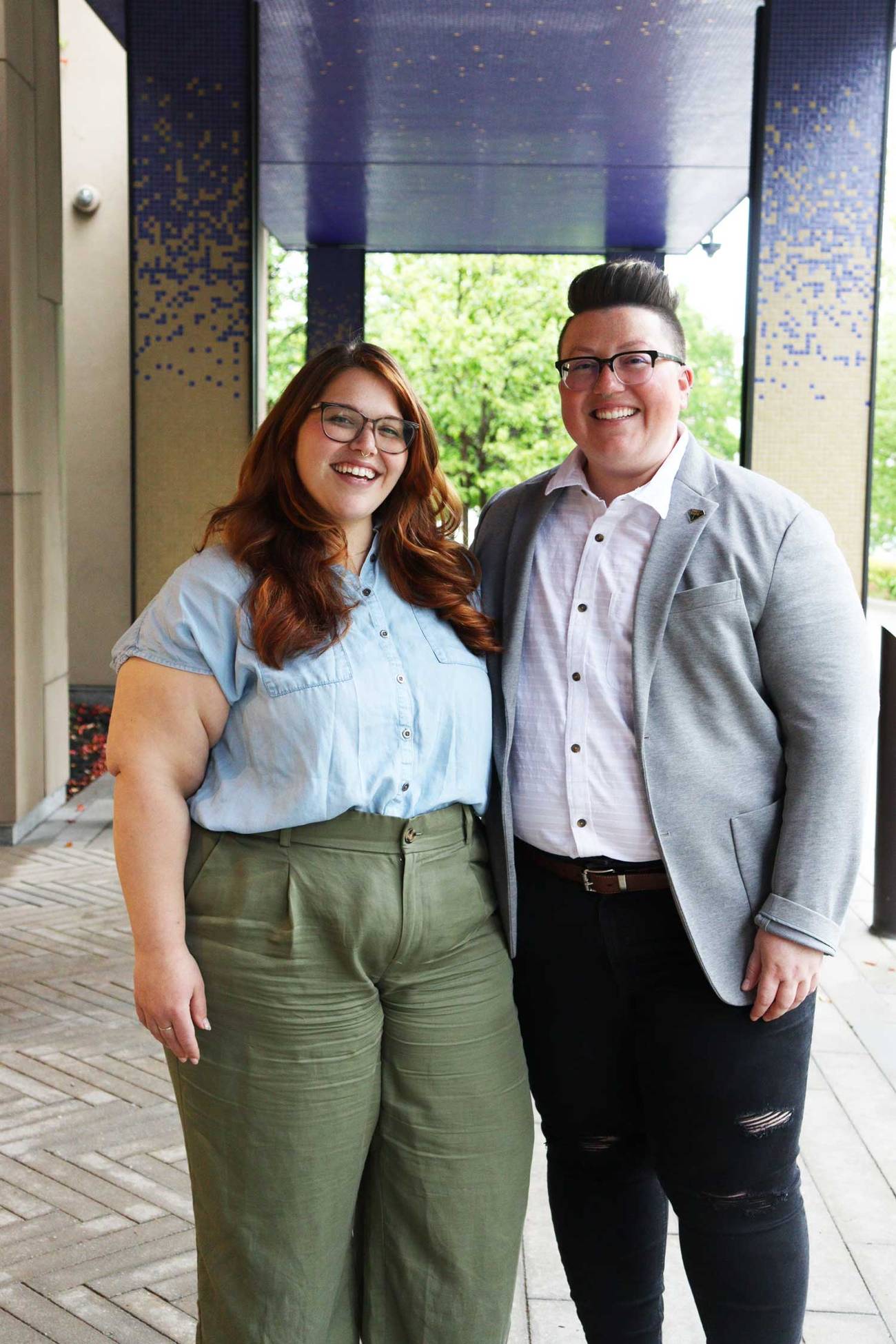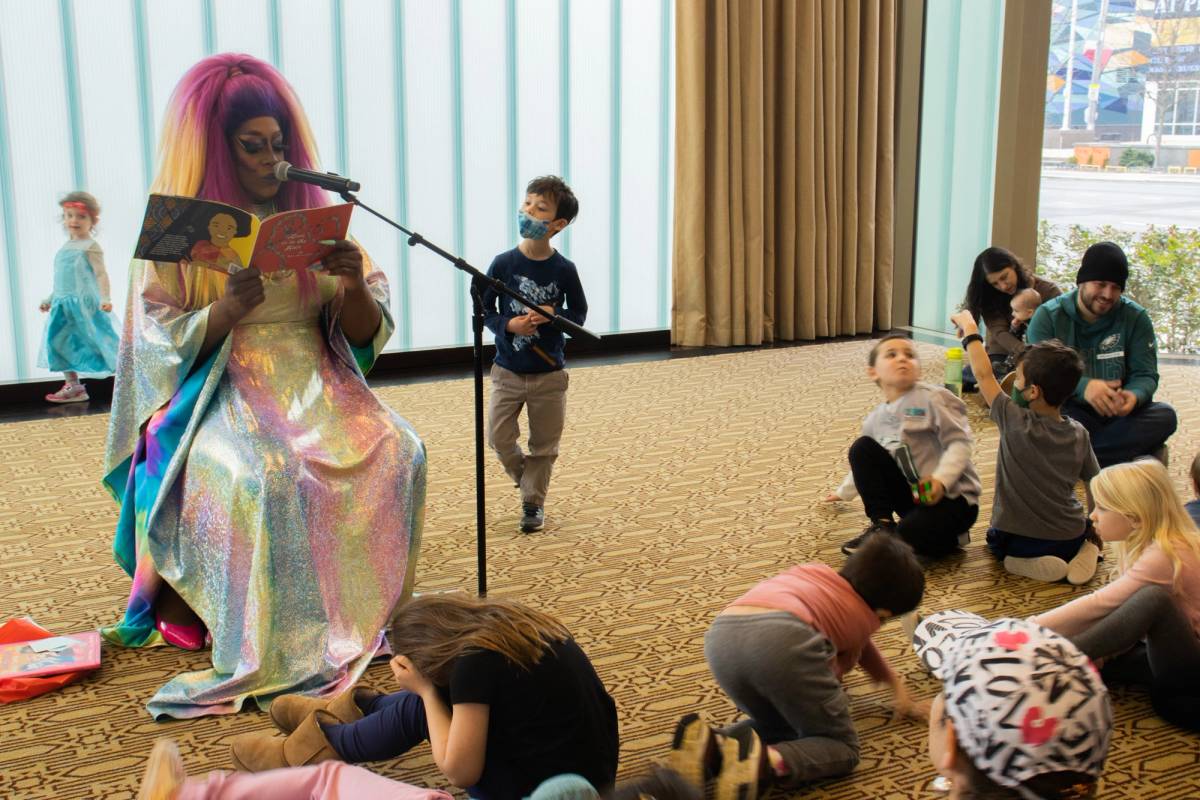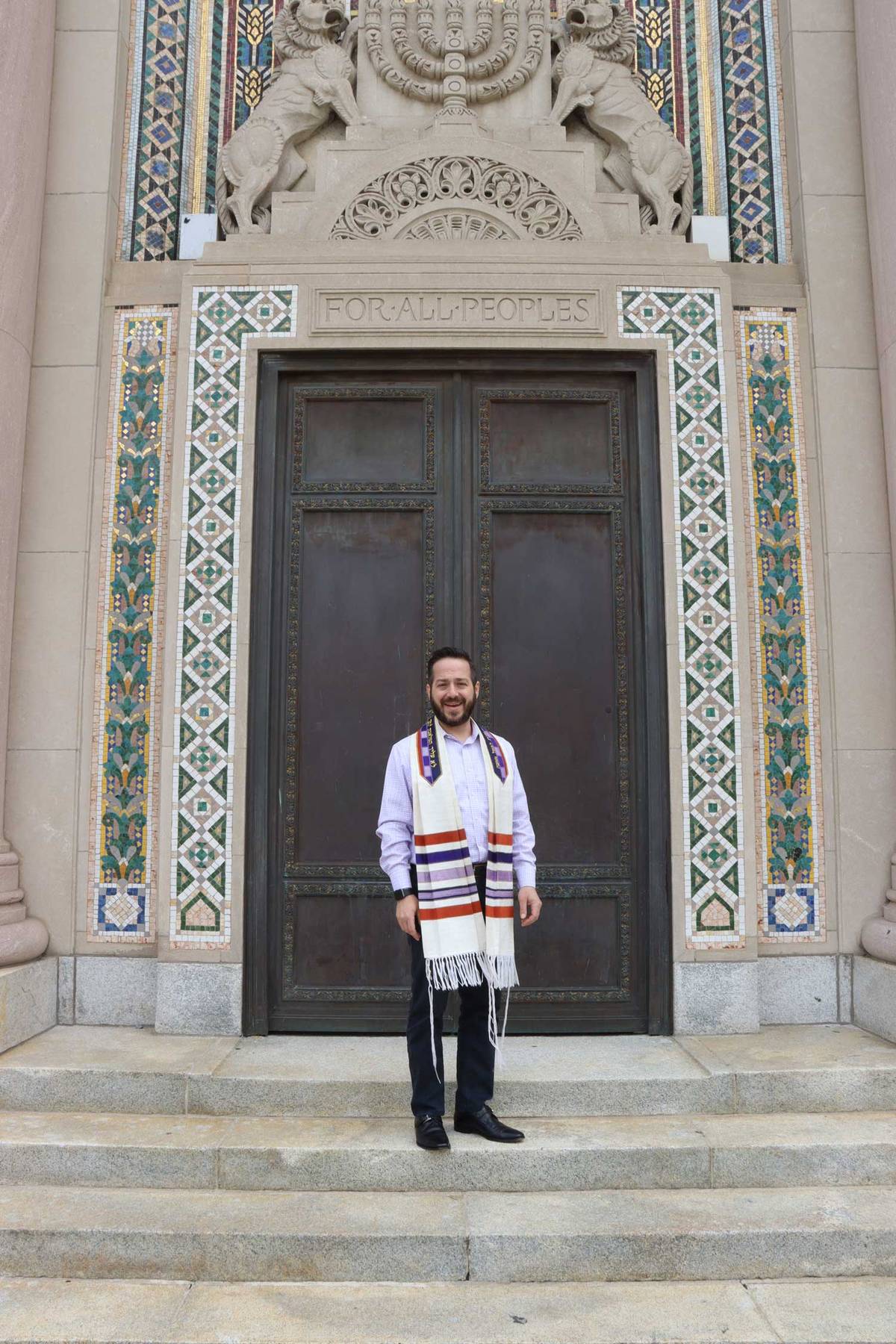Finding a New Spiritual Home
Reform rabbis see an increase in conversion—much of it coming from the LGBTQ+ community




The moment you enter Congregation Rodeph Shalom—the largest Reform synagogue in Philadelphia, with a membership of over 1,000 households—you are greeted by rainbow-colored mezuzahs and a welcome banner featuring a Pride flag.
“Our congregation and progressive Judaism has been incredibly open to the LGBTQ+ community,” said Rabbi Eli Freedman. “We signal it with our messaging on our website and when you walk in our building, and we signal it with reading and language we use from the pulpit.” The shul also hosts a monthly drag story hour for children of all ages.
Freedman has seen a significant increase in the number of conversions to Judaism at Rodeph Shalom over the last few years, and he estimates that about one-third are from the LGBTQ+ community. His current introduction to Judaism class is the largest he has ever seen, with 48 students. In 2022 there were 25 conversions at the synagogue, up from just four in 2019; 18 conversions are already slated for 2023.

Courtesy the author
The number of those seeking conversion grew steadily over the course of the COVID-19 pandemic, Freedman said, as many accessed introduction to Judaism classes via Zoom. “Conversion to Judaism has been increasing as people have been thinking deeper about spiritual issues during the pandemic,” he said, adding that coming face to face with life and death has led many to rethink their relationship to religion.
Rodeph Shalom is not unusual: Conversions to Reform Judaism are on the rise, a trend other rabbis agree was accelerated by the pandemic. And as with Rodeph Shalom—according to Reform rabbis, Jewish organizations, and those converting—a significant number of those converts belong to the LGBTQ+ community.
“Judaism is becoming increasingly attractive to those seeking a new spiritual home,” said Freedman, “at a time when people can transition between identities like never before—including religion and gender.”
Many people found community online during the pandemic, said Freedman, and the Reform community was there and ready to receive seekers. Online access was a lower barrier of entry for many and a safer way to begin to explore Judaism, without physically entering a synagogue. Being more inclusive—around questions of who is Jewish, as well as a diversity of family structures and gender identities—has helped attract people to the Reform community in particular.
Queer and trans people are naturally drawn to progressive movements—our lives depend on social justice.
Nearly one-third of all new and prospective member inquiries at Rodeph Shalom are from LGBTQ+ individuals, said senior membership manager Steven Share, who will marry his fiancé at the synagogue this summer.
Many converts from the LGBTQ+ community say the innate ability to question in Judaism is attractive, allowing space for a diversity of viewpoints. Some inquiries, Share added, are motivated by newly discovered genetic testing results indicating the person is Jewish.
Mon Kramer, 35, a real estate agent in Philadelphia, converted to Judaism in 2017 at Rodeph Shalom. Now a board member at Rodeph Shalom, Kramer met their partner, Maggie McGill, in 2019.
“We can read and interpret Torah through a queer lens,” said Mon. “For example, the Talmud acknowledges six genders.” Life cycle events such as gender-affirmation and naming ceremonies are not always celebrated in other religious cultures, explained Mon.
The nonbinary couple has, on occasion, felt a backlash from Jews in the Reform movement who were raised differently and have more narrow viewpoints of Jewish identity; generational differences are also a factor. Still, they both find Judaism to be a generally welcoming religion to the LGBTQ+ community. “I stepped away from Catholicism and religion because it seemed oppressive,” said McGill, 29, a social media consultant from Maryland who is planning to convert to Judaism. Jewish values, like social justice, healing the world, and valuing diversity and community align with her personal values: “I appreciate the value of asking questions, how can we be better, who is profiting from an action and who is being hurt.”
Reform rabbis across the U.S. are reporting similar trends, especially in urban areas.
Rabbi Neil Amswych of Temple Beth Shalom in Santa Fe, New Mexico, with a membership of 350 households, said there has been a notable increase in membership at his shul over the past few years—largely due to the pandemic and waves of people moving to Santa Fe for a better quality of life.
The number of people from the LGBTQ+ community, in particular, coming to convert to Judaism at Temple Beth Shalom has increased over the last few years, said Amswych. “Having a booth at Pride on the Plaza [a citywide festival] last year was a really important moment for us,” he said. The shul distributed Jewish pride stickers and spoke to people from a faith perspective. “We believe that everyone is created in the image of God, and in our services we include queer liturgy and composers, and in Torah study we look at LGBTQ+ themes.”
The number of people taking Amswych’s introduction to Reform Judaism class has tripled over the last few years. “People coming for conversion say, I want to ask and explore my own questions,” he said. The pandemic “forced a spiritual assessment and this is why more people are looking to join the Jewish community,” said Amswych, a rabbi at the synagogue for nine years.
“People are looking for religious communities that celebrate them authentically expressing themselves,” said Amswych. “Helping people answer their own questions makes Judaism so strong. Reform Judaism is bringing these questions to the community, not just individually.”
Rabbi Jessie Wainer of Reform Congregation Etz Chaim, near Chicago, said there has been an increase in conversion inquiries since 2021, and the majority of the shul’s current conversion candidates identify as part of the LGBTQ+ community: “We have a growing number of people who are in the process of exploring Judaism, from the first exposure all the way through completing the conversion process,” she said. Membership at her shul, about 515 households, has grown over the past few years; the people who contact her to learn more about Judaism are overwhelmingly part of the LGBTQ+ community.
Jewish organizations have increased their online presence and activities during and post-pandemic. Social media also provides a safe way for people to begin to explore Judaism. “It can be very intimidating to walk into a synagogue for the first time to meet with a rabbi, or to seek out Jewish resources,” said Wainer.
Keshet, an advocacy organization for LGBTQ+ equality in Jewish life, has grown extensively since 2019, expanding from four to six regions. Their education and training programs have also expanded to include a mix of in-person and online options. About 700 synagogues, including about 300 rabbis from across denominations, have participated in Keshet programs and training over the last five years, according to communications officer Jay Smith.

Smith, who lives near Boston was raised culturally Jewish, said the first time they attended shul was virtually during the pandemic: “Judaism is a tradition of questioning what we don’t understand, and returning again and again to seek new and better wisdom about ourselves. This also is precisely what queerness is.”
Smith began studying Torah through an online platform called Torah Studio, forming a community with “trans/gender-expansive” peers who live in Ohio and Australia. “This process of profound and deep introspection, and a curious search for meaning, feels intertwined through both my Jewish and trans existence,” they explained.
Some converts say once they had explored their own sexuality or gender identity, exploring their faith became much easier. Transitioning connects to a spiritual conversion, as well.
Noah Strauss, 29, and Katriel Nopoulos, 34, celebrated their b’nai mitzvah together last February at Rodeph Shalom. The nonbinary couple said they find identity and safety in Jewish traditions, while gender identity is more fluid within Jewish culture.
“Reform Judaism allows queer and trans people to create their own rituals within the Jewish framework and life cycle,” said Nopoulos, a TikTok content creator from central Pennsylvania who was raised Lutheran and converted to Judaism.
Strauss, a master’s student in human rights at Gratz College, was raised Jewish and says Judaism is all about welcoming the stranger. “Queer and trans people are naturally drawn to progressive movements—our lives depend on social justice,” said Strauss, who had a name-changing ceremony at Rodeph Shalom.
The national Reform rabbinical organization, the Central Conference of American Rabbis, with about 2,200 members, says LGBTQ+ advocacy is part of the DNA of the denomination. “Over the past few years, particularly during the pandemic, I have heard anecdotally from CCAR rabbis that there has been an increase in both conversions and in conversions by members of the LGBTQ+ community [to Reform Judaism],”said Rabbi Hara Person, CCAR’s chief executive. (CCAR does not keep records related to conversions. This information can be found at individual synagogues, making it difficult to gather national statistics.) CCAR runs year-round programming supporting the LGBTQ+ community and clergy, such as training for inclusive worship life cycle events, like gender-affirmation ceremonies.
Reform Judaism remains the largest American Jewish denomination, according to the Pew Research Center. Many Reform Jews prefer to attend services without membership, and may attend virtually, even post-pandemic, making geographic limitations less of a barrier.
Interestingly, conversions across the entire American religious landscape are on the rise. According to a recent study published by the Public Religion Research Institute, in 2022, about 1 in 4 Americans (24%) say they previously followed a different religious tradition than the one they follow now, mostly leaving Christianity or religion altogether; in 2021, only 16% of respondents had changed religions. Of those who left a religious tradition, 30% indicate they were turned off by the religion’s negative teachings about or treatment of LGBTQ+ people.
“As a minority religion, we often stand with others that feel marginalized,” said Freedman. “To quote Rabbi Leo Baeck, ‘The blessing of being in the minority is that a minority is compelled to think.’”
Erica Silverman is a reporter and photojournalist based in Philadelphia; she also reported for the United Nations news agency, IRIN, from Israel and the Palestinian Territories.